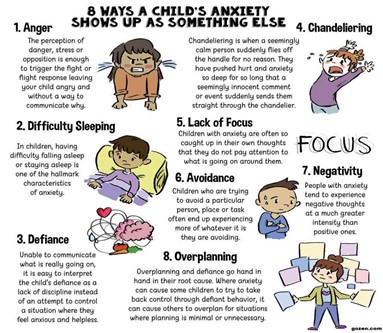Anxiety in children, what is it?
Have you ever felt worried, nervous or apprehensive about a situation? There is a good chance that your child has as well. Think back to a time when you have felt like this, you may have felt 'butterflies in your stomach'. This could have been your first day of a new job, giving a talk in front of people. Your child may have experienced these feelings on their first day of school or before an exam or class presentation. It is important for us to remember that feeling worried, fearful or anxious is sometimes normal and that we all have this experience from time to time. For children, feeling worried or anxious at times is in fact a normal part of development. However, if children have excessive or repeated fears, worries and anxious feelings that last for weeks or more, and start to interfere with typical daily activities, such as going to school or seeing friends, and are severe or long-lasting it may be an anxiety disorder.
So how do you know if your child is experiencing anxiety?
As a parent how do we know what is a 'normal' amount of worry and what is not. Anxiety can show up in many ways, making it hard to spot the signs of anxiety in our children and to know when to seek further help and support. It's not uncommon for parents to avoid a situation that makes your child anxious, this may seem best, after all you just want your child to feel ok, but it can quickly become a pattern that is hard to break and result in their worries and anxiety growing.
Common signs and symptoms of anxiety to look out for:



When to seek help and where to find it:
Generally, professional assistance should be sought if symptoms or signs of anxiety appear frequently, in an ongoing pattern, is causing them significant distress, if it is not age appropriate, and/or if it is interfering in their academic, social or family life.
If you have concerns you could speak with your child's teacher to see if their worries or anxious feelings are present at school and/or in the classroom. Schools can have a range of trained staff members to provide support, such as the Guidance Officers, Social Workers, Psychologists, Chaplin's and Youth Support Workers. Contact your school to see what support options are available for your child.
Consider discussing your concerns with their GP or another health professional. Some indicators that it is time to seek help from your GP include:
- if your child seems excessively worried or anxious, or feels anxious more often than not.
- if anxiety stops your child from taking part in typical daily activities, such as attending school, socialising, eating and sleeping well, they experience frequent somatic symptoms such as; headaches, tummy ache or nausea.
Diagnosis and treatment of an anxiety condition or disorder in a child can be provided by a trained and experienced health professional. If needed, a GP can arrange a referral to a paediatrician, child psychologist or other mental health professional to assess and support your child. Common types of anxiety disorders in children include social anxiety, separation anxiety and generalised anxiety.
If you are a parent or carer with anxiety, it is important to also care for your own mental health and seek help when you need it.

How to help your child at home:
- Encourage your child to talk about their feelings with you.
- Validate how they are feeling, it's important not to dismiss their feelings.
- Let them know these feelings are common, that you feel worried or scared sometimes to.
- If a particular situation is challenging for your child, support them to gradually do the thing that makes them anxious rather than avoiding it, Eg. if going to a crowded shopping centre makes them anxious, start with short trips to the local shops first.
- Talk about a plan to help cope with anxious feelings in the future, such as breathing techniques or reassuring phrases to focus on.
- Take time out to have fun together and take the focus off feelings of anxiety.
- Help your child to have healthy routines; good-quality sleep, regular outdoor exercise, eating well and avoiding excessive screen time.
- Prioritise your child attending school to develop important skills and knowledge to help them learn and build their social and emotional skills.
Useful resources and sources:
· Beyond Blue: https://www.beyondblue.org.au/mental-heaalth
· The Royal Children's Hospital: https://www.rch.org.au/kidsinfo/anxiety-primary-aged/
· Raising Children Network: https://raisingchildren.net.au/toddlers/health-daily-care/mental-health/anxiety-in-children
· WayAhead: https://understandinganxiety.wayahead.org.au/understanding-anxiety/
Tina Taylor; School Social Worker